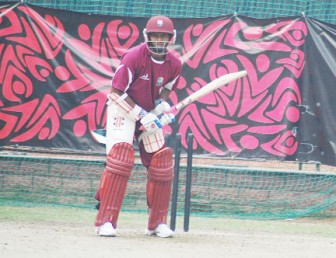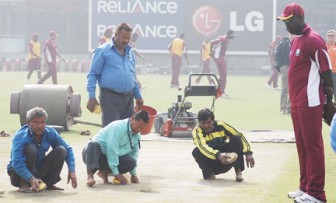By Tony Cozier
At the ICC World Cup
In DELHI
Ottis Gibson’s main tasks leading into the West Indies’ opening match of the ICC World Cup at the Feroz Shah Kotla here today are as much psychological and selectorial as technical and tactical.
Against South Africa, generally favoured behind only India to be champions come April 2, it is as tough a challenge as can be expected, no matter how far they progress in the tournament.
Since they have been whitewashed by these opponents in each of their last two series, most recently 5-0 in the Caribbean last year, and their previous victory over them was five years and 11 ODIs ago, the head coach has spent much of his time since arriving in India trying to convince his charges to disregard such statistics.

The issue is compounded by even more such figures. In the past year, the West Indies have won only six of their 20 ODIs – four over Zimbabwe and one each over Canada and Ireland, all teams ranked even before themselves.
For someone not trained in such skills, Gibson’s is an unlikely undertaking and explains why a specialist was signed on to try to deal with it during the preparatory camp in Barbados and for the preceding ODI series and World Cup warm-ups in Sri Lanka.
Since Simon Grayson, the Englishman whose contract is not with this team at all but with the Sagicor High Performance Centre in Barbados, did not accompany the team to India, Gibson was left to fill his role, in addition to his assigned duties.
His theme to players to whom losing has become a seemingly unshakable habit is the same as that given to addicted smokers – it can be done.

He has the evidence to prove that South Africa, or anyone else for that matter, can be beaten. The trick is for his charges to truly believe it.
Dwayne Bravo stretched the point somewhat yesterday by claiming that the West Indies could have won last year’s ODI series in the Caribbean 4-1, instead of losing it 5-0, but twice their self-doubt, built up over years, allowed South Africa to snatch away victory that was theirs until the very end.
In Roseau, the West Indies compiled a strong total of 303 for six from their 50 overs and would have won but for a fluffed run out off the last ball that allowed AB deVillier and JP Duminy to clinch the decisive run. In the next match in Port-of-Spain, Nos. 9, 10 and 11 (Roelf van der Merwe, Charl Langeveldt and Lonwabo Tsotsobe) hit 20 off 12 balls to secure South Africa’s fifth straight win with two balls and one wicket remaining.
“We had a lot of opportunities, a lot of key moments that could have won us matches but simple mistakes cost us,” Bravo claimed.
“We have identified those mistakes. We have to come up with good game plans as to how if those those situations do occur again, we will be more prepared to facing them.” Another of Gibson’s mantras, obvious as it may seem, is that an upset (as a West Indies win tomorrow would undoubtedly be) is far more likely in a one-off match
in a multi-team tournament than in a bi-lateral series of five.
On this count, he is supported by a previous match against South Africa, even though to source it he has to go back to the Champions Trophy in 2006, also staged in India. The West Indies entered as the 2004 champions yet, on the basis of ICC’s standings, were forced to pass through a qualifying round to enter the competition proper.
Once there, they defeated Australia, India and South Africa before losing to Australia in the final.
Only four West Indians (Chris Gayle, Shivnarine Chanderpaul, Ramnaresh Sarwan) and three South Africans (Graeme Smith, Jacques Kallis and deVilliers) are here five years later. To place any store on such a distant result might seem a little far-fetched but, in the West Indies’ recent circumstances, any straw is to be snatched at.
More immediate for Gibson and his co-selectors is the matter of the starting 11.
The early signs support the initial theory that pitches will favour spinners and those who, in the modern jargon, take the pace off the ball. While today’s is the first used at the Feroz Kotla since the ICC suspended it as too dangerous following an abandoned ODI last year, it is expected to be comparable.
They are not unlike those against the South Africans at Windsor Park in Dominica and the Queen’s Park Oval in Trinidad last season when only one fast bowler (Ravi Rampaul in the former, Jerome Taylor in the latter) was chosen along with all the medium-paced all-rounders (Darren Sammy, Dave Bernard, Dwayne Bravo, Kieron Pollard) and Chris Gayle bowled his full allocation of 10 overs, as did Sulieman Benn. A similar combination is likely now although not so had Taylor been here, rather than back home returning to the game in the regional first-class season following injury, and the young opener Adrian Barath and wicket-keeper Carlton Baugh not been eliminated just a week prior to the Cup by torn hamstrings, to be replaced by Kirk Edwards and Devon Thomas. Given the expected conditions and the enforced composition of the squad, the likely 11 would be (in batting order): Gayle, Devon Smith, Darren Bravo, Ramnaresh Sarwan, Shivnarine Chanderpaul, Dwayne Bravo, Pollard, Sammy, Devon Thomas, Benn, Kemar Roach. It is a hardly a combination to stack up against South Africa but Gibson is undaunted. “People are not giving us a chance but that gives us an opportunity to go out there and prove everyone wrong,” he said. “We can stay focussed on our job and surprise a few people. We will go there with the expectation of doing very well.”
Today’s opening match will determine whether or not such hopes and faith are misplaced.








